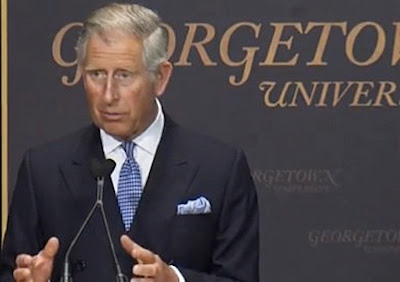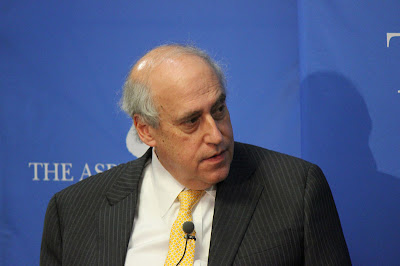
 |
The Future of Food
Like a modern Paul Revere, Britain’s Prince Charles has long been warning the world that our food supply―threatened by contamination, adverse production methods and increasing scarcity―is in more danger than we realize. Now, in part spurred by a compelling speech he gave last year in Washington, the world is listening. (Britain’s Prince Charles at GT University shown above)
Global organizations are working on the problem, local programs are exploring solutions. At The Aspen Institute think tank in Dupont Circle an overflow crowd of largely 30 some-things listened raptly to a panel discussion on the future of food. The audience ranged from a lady who farms oysters on the Eastern Shore, to a member of a Minnesota farm family.
The event marked the release of a book drawn from Prince Charles’s speech on sustainability and food. ( The Prince’s Speech: On the Future of Food.” Rodale Books, $6.95).
 |
||
| Dan Glickman Photo credit: Zachary Kulzer/The Aspen Institute |
Unfortunately, what seems progress in one area creates huge difficulties in another. For example: ethanol was developed as an alternative fuel, but massive amounts of both energy and corn are used to create it, removing nutrition from a hungry world. Four out of every ten bushels of grain we grow goes to fuel our vehicles. Massive industrialized agriculture cut food costs dramatically. That’s good, until you factor in the ultimate costs of removing the chemical pollution that accompanies it, its costly destruction of the environment and the enormous amounts of nonrenewable oil and natural gas agribusiness uses.
Glickman asked the panel for their possible solutions.
Glickman spoke of the importance since Biblical times of the producers of food and concurred with the Prince’s conviction that small farms and respect for the growing of food and nature be encouraged.
Producing meat consumes enormous amounts of grain and water― an estimated 2,000 gallons for every pound of beef, and this, with careless loss of topsoil, increases the threat of water scarcity. And with urban expansion, grazing space for the animals is shrinking.. The antibiotics used at in livestock production pose problems as well.
All of this reminds us that our capital depends on Nature’s capital.